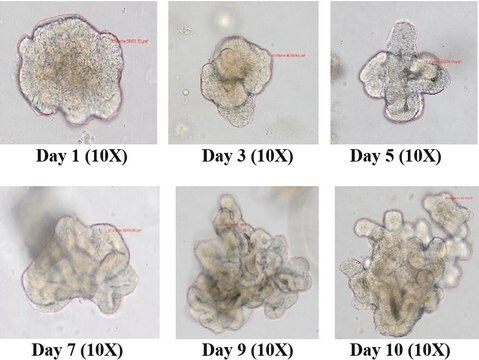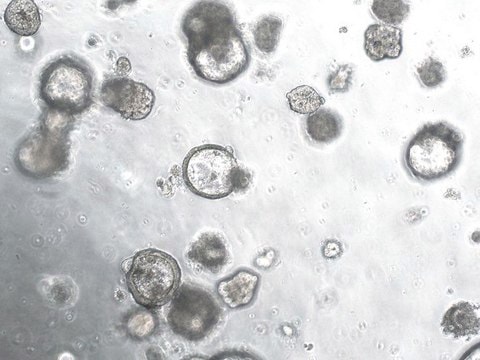SCM301
3dGRO® Organoid Freeze Medium
Optimized cryopreservation media for multiple organoids cell types.
Sinônimo(s):
Organoid cryopreservation medium
About This Item
Produtos recomendados
forma
liquid
técnica(s)
cell culture | stem cell: suitable
Categorias relacionadas
Descrição geral
• Similar composition and architecture to primary tissue: Organoids harbor small population of self-renewing stem cells (such as intestinal crypt stem cells) that can differentiate into cells of all major cell lineages, with similar frequency as in physiological conditions.
• Relevant models of in-vivo conditions: Organoids are more biologically relevant to any model system and are amenable to manipulate niche components and gene expression.
• Stable system for extended cultivation: Organoids can be cryopreserved as biobanks and expanded indefinitely by leveraging self-renewal and the differentiation capability of the stem cell populations.
Organoids can be cryopreserved using standard cell freezing techniques however freeze/thaw viability remains a challenge. The 3dGRO Organoid Freeze Medium is a proprietary optimized cryopreservation media for multiple organoids cell types (etc. mouse intestinal organoids, human colon and lung organoids). The media supports higher freeze/thaw viabilities compared to other commercial or homemade organoid freezing media formulations.
Aplicação
Cell Culture
Stem Cell Research
Qualidade
Osmolality: 250-350 mOsm
pH: 6.8-7.1
Sterility Tested: No Growth/Pass
Bacterial & Fungal Tested: Passed
Armazenamento e estabilidade
Informações legais
Exoneração de responsabilidade
Código de classe de armazenamento
12 - Non Combustible Liquids
Classe de risco de água (WGK)
WGK 3
Ponto de fulgor (°F)
Not applicable
Ponto de fulgor (°C)
Not applicable
Certificados de análise (COA)
Busque Certificados de análise (COA) digitando o Número do Lote do produto. Os números de lote e remessa podem ser encontrados no rótulo de um produto após a palavra “Lot” ou “Batch”.
Já possui este produto?
Encontre a documentação dos produtos que você adquiriu recentemente na biblioteca de documentos.
Os clientes também visualizaram
Artigos
Human epithelial intestinal colonic organoids can be used as an alternative to Caco-2 drug permeability assays for drug screening and compound toxicity testing.
Lung organoids are valuable 3D models for human lung development and respiratory diseases. The 3dGRO™ differentiation protocol generates organoids from human iPSCs in 4 steps.
Organoid culture FAQs. Learn how to culture and analyze organoids following established 3D cell culture protocols. Tips and tricks.
Organoid culture products to generate tissue and stem cell derived 3D brain, intestinal, gut, lung and cancer tumor organoid models.
Protocolos
How to stain organoids? A complete step-by-step protocol for immunofluorescent (IF) and immunocytochemical (ICC) staining of organoid cultures using antibodies
A rapid in vitro assay for CFTR function, the forskolin-induced swelling protocol uses human colon organoids, which can be derived from cystic fibrosis patient tissue.
Highly characterized cryopreserved human colonic organoids and a step-by-step organoid culture protocol for epithelial intestinal organoid differentiation from iPS cells.
Nossa equipe de cientistas tem experiência em todas as áreas de pesquisa, incluindo Life Sciences, ciência de materiais, síntese química, cromatografia, química analítica e muitas outras.
Entre em contato com a assistência técnica








